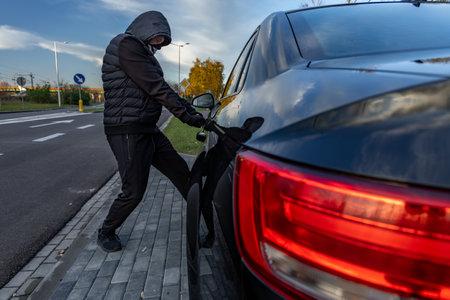Understanding Car Theft and Your Insurance Policy
Car theft is an unfortunate reality for many UK motorists, and understanding what constitutes car theft, along with the specific terms of your insurance policy, is essential when it comes to reporting and claiming for such incidents. In the UK, car theft is defined as the unauthorised taking of a vehicle with the intent to permanently deprive the owner of it. This can include classic theft where the entire vehicle is stolen, as well as scenarios where only parts or valuables from inside the vehicle are taken.
Common scenarios of car theft in the UK include:
| Scenario | Description |
|---|---|
| Complete Vehicle Theft | Your entire car is stolen and cannot be found. |
| Keyless Car Theft | Thieves use technology to intercept your key fob signal and steal your car without needing physical keys. |
| Theft from Vehicle | Items such as sat navs, stereos, or personal belongings are taken from inside your car. |
| Attempted Theft | Your car has signs of attempted break-in or tampering, even if not actually stolen. |
Before making any claim, it’s crucial to review your insurance policy. Not all policies offer the same level of cover, so check for:
- Theft Cover: Ensure your policy includes theft protection (usually covered under ‘comprehensive’ or ‘third party, fire and theft’ policies).
- Exclusions: Review any exclusions such as leaving keys in the ignition or failing to secure the vehicle properly, which could invalidate your claim.
- Personal Belongings: Some policies may only cover items left in the car up to a certain value, or not at all.
- Reporting Requirements: There may be specific requirements on how quickly you must report the theft to both police and your insurer.
Understanding these details will put you in a stronger position when navigating the claims process after a car theft incident in the UK.
Immediate Steps to Take After Discovering Car Theft
Discovering that your car has been stolen can be a distressing experience, but staying calm and acting quickly is essential to ensure your safety and maximise the chances of recovering your vehicle. Here’s what you should do immediately:
1. Ensure Your Safety First
If you suspect your car has just been stolen or you witnessed suspicious activity, do not attempt to confront the thief. Move to a safe location—preferably indoors or in a public area with other people around. Your personal safety is more important than any property loss.
2. Double-Check Before Reporting
Before contacting the authorities, make sure your vehicle hasn’t been parked elsewhere, borrowed by family or friends, or towed for parking violations. Check with anyone who may have access to your keys and review local parking restrictions or private car park regulations. This step helps avoid unnecessary alarm and ensures you provide accurate information to the police.
3. Gather Key Details and Documentation
Collect all relevant details about your car and the circumstances of its disappearance. Having this information at hand will streamline the reporting process:
| Information Needed | Examples |
|---|---|
| Vehicle Details | Registration number (number plate), make, model, colour, unique features or modifications |
| Date & Time | When you last saw your car and when you noticed it missing |
| Location | The exact spot where your car was parked (street name, postcode) |
| Personal Items Inside | A list of valuables or important documents left in the vehicle |
| CCTV/ Witnesses | Any available CCTV footage or witnesses who may have seen the theft occur |
4. Notify Local Authorities Immediately
Contact your local police force as soon as possible by calling 101 (the non-emergency number in the UK) or 999 if you believe the theft is in progress or there’s immediate danger. Provide all collected details accurately. The police will issue a crime reference number—make sure to record this as you’ll need it for your insurance claim.
5. Inform Relevant Organisations
If you have a vehicle tracking system installed, notify the provider so they can assist the police with tracking your car’s location. Additionally, if your car’s keys were stolen along with the vehicle, let your insurer know as soon as possible.
![]()
3. How to Report the Theft to the Police
If you discover your car has been stolen, it is crucial to report the theft to the police as soon as possible. This not only increases the chances of recovering your vehicle, but it is also a necessary step for making an insurance claim. Here’s a detailed step-by-step guide on how to report a stolen vehicle in the UK:
Contacting the Police
Dial 101, which is the non-emergency number for the police in the UK, or 999 if you believe the theft is currently in progress or there is immediate danger. Provide all relevant details about your car, such as make, model, colour, registration number, and any unique features. If you have CCTV footage or any information about the suspected thief, inform the officer during your call.
Obtaining a Crime Reference Number
Once you have reported the theft, the police will provide you with a crime reference number. This number is essential for tracking your case and must be quoted when contacting your insurer or following up with law enforcement.
| Step | Action | Details Required |
|---|---|---|
| 1 | Call 101 or 999 | Vehicle details, location, time of theft |
| 2 | Provide additional evidence | CCTV footage, witness statements (if available) |
| 3 | Receive crime reference number | This will be used for all future correspondence |
The Importance of an Official Police Report
An official police report serves several critical purposes. Firstly, it confirms that you have followed legal procedures. Secondly, insurers require a police report and crime reference number before processing any claims related to car theft. Without these documents, your insurance company may refuse to cover your loss. Always keep a record of your crime reference number and any communication with the police for your records.
4. Contacting Your Insurance Provider
Once you have reported the theft to the police and obtained your crime reference number, the next crucial step is to contact your insurance provider as soon as possible. Timely notification is essential, as most insurers in the UK require you to report a stolen vehicle within 24 hours of discovering the theft. Failing to do so could affect your claim’s outcome.
How to Inform Your Insurance Company
Contact your insurer via their dedicated claims helpline or online portal. Many insurers operate 24/7 hotlines for emergencies such as car theft. When calling, have your policy number, personal details, and crime reference number ready. If you prefer online services, log into your account and follow the instructions for reporting a stolen vehicle.
Information You’ll Need to Provide
To process your claim efficiently, your insurer will request specific details regarding the theft. Preparing this information beforehand can speed up the process:
| Required Information | Description |
|---|---|
| Policy Number | Your unique insurance policy identifier |
| Personal Details | Name, address, and contact information |
| Vehicle Details | Make, model, registration number, colour, mileage, and any distinguishing features |
| Date & Time of Theft | When you discovered your car was missing |
| Location of Theft | The exact place where the vehicle was last seen or stolen from |
| Crime Reference Number | Provided by the police when you reported the theft |
| Details of Keys & Security Devices | Who had access to keys and whether security devices were fitted/activated |
| Circumstances of Theft | A brief description of how and when the incident occurred |
Timeframes to Adhere To
The time window for notifying your insurer is typically within 24 hours after discovering the theft. It’s best not to delay—early communication demonstrates diligence and helps prevent complications with your claim. After initial contact, your insurer may outline additional deadlines for submitting supporting documents or evidence, so keep an eye on emails or letters from them.
Quick Tip: Keep Records!
Always record names, times, and reference numbers during every conversation with your insurer. This ensures clarity if there are follow-up queries or disputes later on.
5. Submitting Your Claim and Supporting Documentation
Once you have reported your car theft to the police and informed your insurance provider, the next crucial step is submitting your claim along with all the required paperwork. Insurers in the UK typically require a range of documents to process your claim efficiently and to confirm that all the necessary steps have been followed.
Essential Documents Required by UK Insurers
Your insurer will expect you to provide clear evidence relating to the ownership, use, and circumstances of the stolen vehicle. Below is a table summarising the key documents you may need:
| Document | Description | Where to Obtain |
|---|---|---|
| Proof of Ownership | V5C logbook (vehicle registration certificate) or purchase receipt showing your name as the owner | DVLA, Car Dealership, Private Seller |
| Police Crime Reference Number | The unique number provided when you report the theft to the police | Your local police station or via 101 reporting system |
| Insurance Policy Details | Your policy number and relevant information about your cover | Your insurance documents or online account |
| MOT Certificate (if applicable) | Latest MOT test certificate for your vehicle, showing it was roadworthy at time of theft | From MOT test centre or DVSA website |
| Keys (all sets) | All keys supplied with the vehicle must be accounted for; missing keys can affect your claim outcome | Your personal possession; inform insurer if any are missing or were stolen with the car |
| Service Records and Receipts (optional) | If requested, provide maintenance records for further proof of ownership and vehicle value | Your records or service garage receipts |
| Photographic Evidence (if available) | Photos showing condition of vehicle before theft, or CCTV footage if available | Your own files or request from property owners nearby where theft occurred |
Tips for a Smooth Claims Process
- Submit originals or certified copies: Insurers may request original documents or certified copies to prevent fraud.
- Keep digital backups: Scan important documents and back them up securely for quick access during claims.
- Respond promptly: If your insurer requests additional information, respond as quickly as possible to avoid delays.
- Retain communication records: Keep copies of emails, letters, and notes from phone calls for reference throughout your claim.
The more thorough and organised you are with your documentation, the smoother and faster your claim process will be. Make sure everything is complete before submission, as missing paperwork can cause significant delays in receiving a settlement.
6. Processing Times and What to Expect from Your Claim
After you’ve reported your car theft and submitted a claim to your insurer, it’s natural to wonder how long the process will take and what steps are involved. In the UK, insurance companies have clear procedures for handling theft claims, but timescales can vary depending on several factors.
Typical Timescales for Car Theft Claims
| Step | Estimated Duration |
|---|---|
| Initial notification & documentation gathering | 1-3 days |
| Insurer investigation & police liaison | 7-30 days |
| Claim decision & payout (if approved) | 5-14 days after final decision |
These timeframes can be influenced by how quickly you provide required documents, how promptly the police file their report, and whether there are any complications with your case.
Possible Investigations by Insurers
Insurers in the UK take car theft seriously and will usually carry out their own investigations alongside the police. This may include:
- Contacting the police for updates on their investigation and confirmation of the crime reference number.
- Checking for any previous claims or inconsistencies in your insurance history.
- Requesting further evidence, such as proof of ownership, service records, or information about the vehicle’s condition prior to theft.
- If your car is financed or leased, liaising with the finance company regarding outstanding payments.
How Insurance Companies Handle Theft Claims
The insurer’s main goal is to ensure that claims are genuine and supported by adequate evidence. Here’s what typically happens:
- Your claim is assigned to a dedicated handler who will keep you updated on progress.
- If your vehicle is recovered within a short period (usually within 30 days), the insurer will assess its condition before settling your claim.
- If your car isn’t found, the insurer will value your vehicle based on its market worth at the time of theft—minus any excess agreed in your policy.
- Payouts are generally made via bank transfer directly to you or, if financed, to the lender first.
Delays and How to Avoid Them
To avoid unnecessary delays:
- Submit all requested documents promptly.
- Keep in regular contact with both the police and your insurer.
- Be honest and transparent throughout the process—any suspicion of fraud can prolong investigations significantly.
If everything goes smoothly, most UK insurers aim to resolve straightforward car theft claims within a month. However, more complex cases may take longer, especially if there are disputes over valuation or coverage terms. Always check with your specific insurer for detailed guidance and support during this stressful time.
7. What to Do if Your Stolen Car is Recovered
If your stolen car is found and returned to you, it’s essential to follow the correct steps to ensure your insurance claim is handled smoothly and your vehicle is roadworthy. Here’s a clear guide on what you should do next:
Contact Your Insurer Immediately
Once the police inform you that your car has been recovered, notify your insurance company right away. They will want to know the current condition of the vehicle and may pause or adjust your claim depending on any damage sustained while the car was missing.
Arrange for Inspection and Assessment
Your insurer will typically require a thorough inspection of your vehicle. This process checks for damage, missing parts, or evidence of tampering. Some insurers have preferred repairers or approved garages; others may let you choose. Always confirm with your insurer before proceeding.
| Step | Action | Who to Contact |
|---|---|---|
| 1 | Inform insurer about recovery | Your insurance provider |
| 2 | Schedule inspection/assessment | Approved garage or assessor |
| 3 | Get police crime reference updated | The police (non-emergency 101) |
| 4 | Begin repairs if needed | Authorised repair shop |
| 5 | Discuss claim adjustments if necessary | Your insurance claims handler |
Check for Damages and Needed Repairs
If your car has suffered damage or parts have been stolen, your insurer will advise whether it’s economically viable to repair or if it will be declared a total loss (write-off). If repairs are approved, keep all receipts and documentation for any work done.
If Repairs Are Needed:
- Only use garages authorised by your insurer.
- Request a detailed report of all work carried out.
- Confirm whether you need to pay an excess fee as per your policy terms.
Update the Police and DVLA Records
You must also update the police with the recovery details so they can close the theft case. If you reported your car as stolen to the DVLA, let them know it has been found to ensure all records are accurate.
Key Points:
- Do not drive the car until it has been fully checked and deemed safe.
- If personal belongings are missing, these may not be covered under standard motor insurance – check with your provider.
- If your claim was already settled as a total loss, discuss with your insurer what happens next regarding ownership or return of settlement funds.
Treating the recovery process methodically ensures both your safety and that your insurance is handled properly, minimising hassle down the line.


